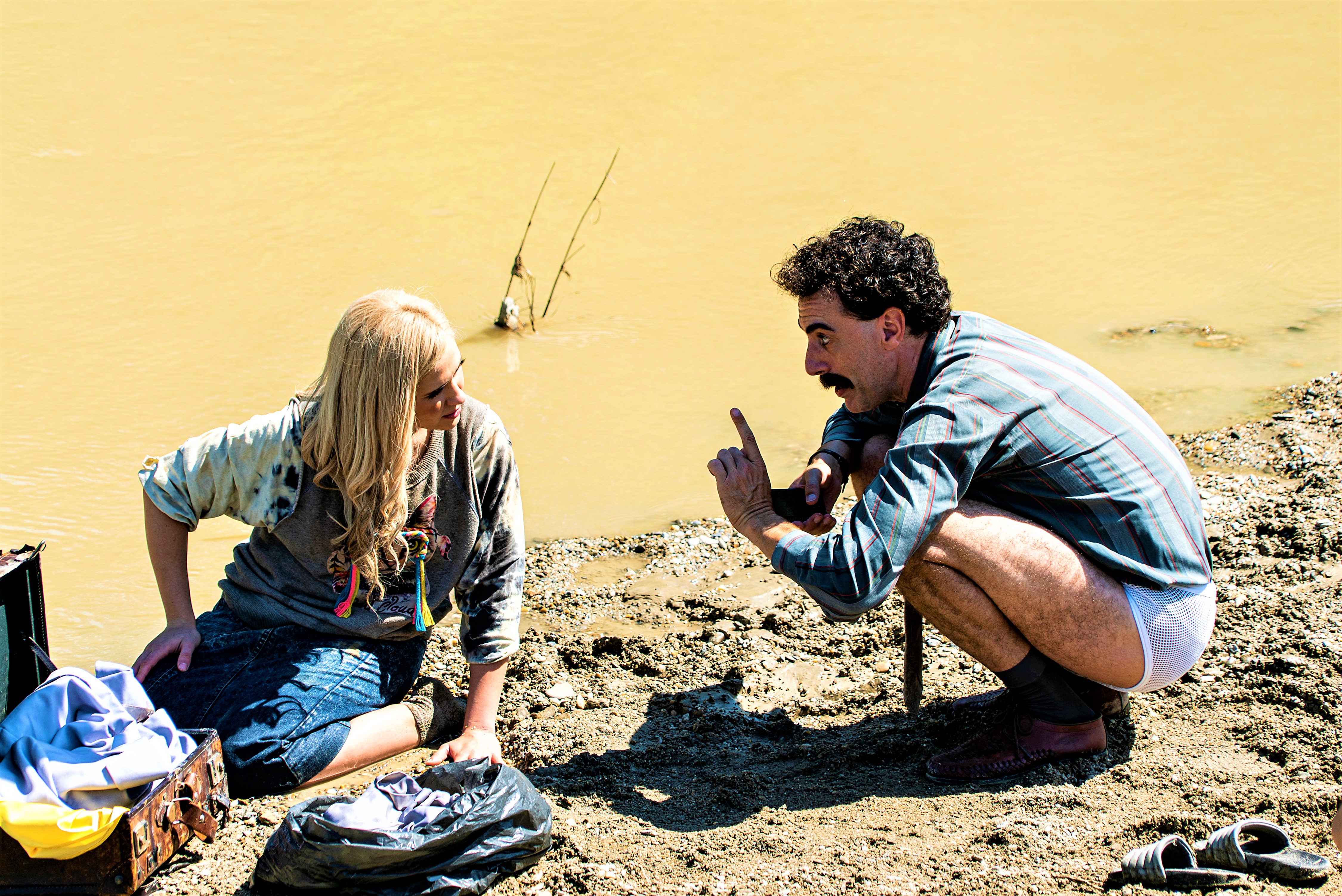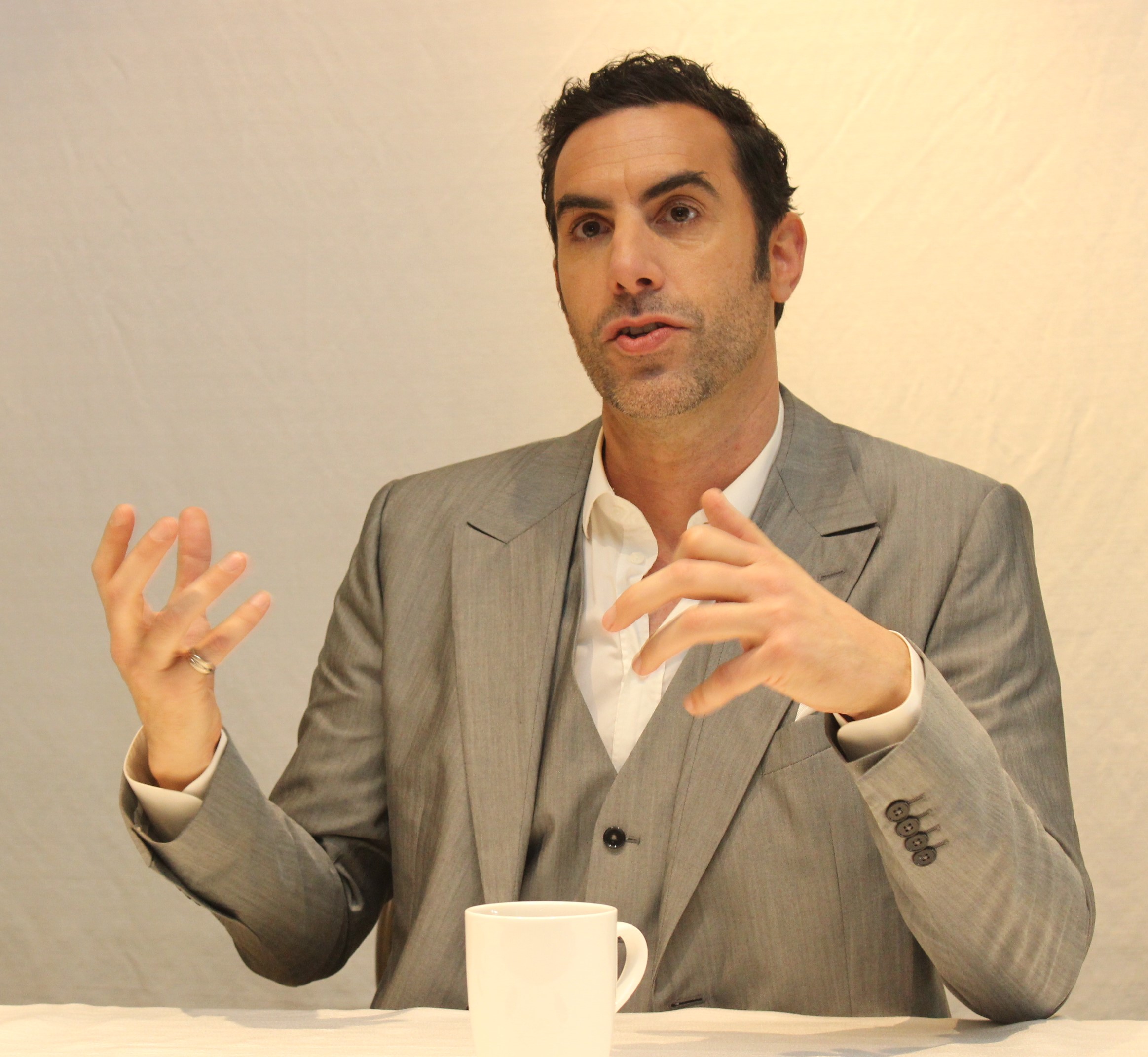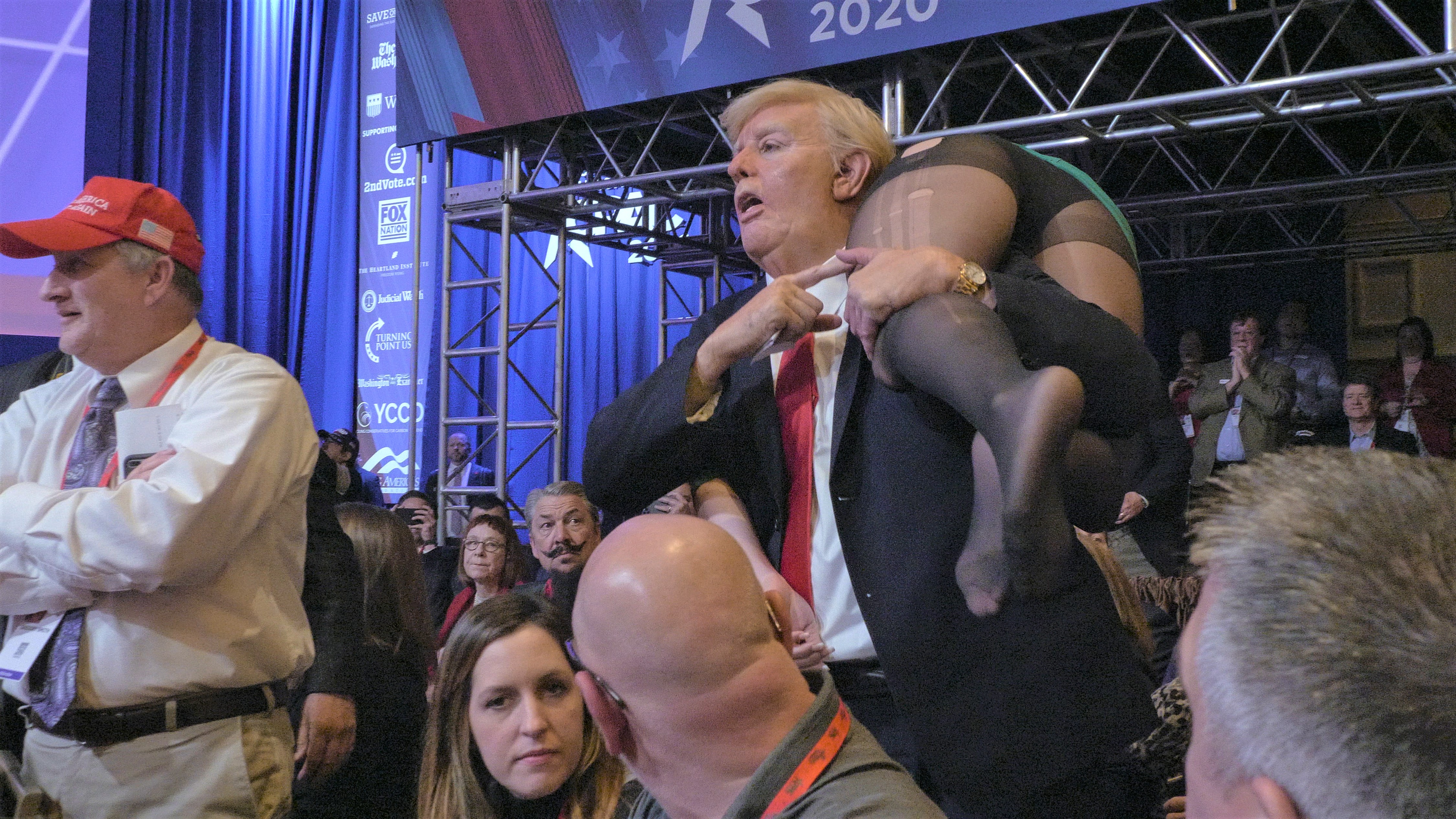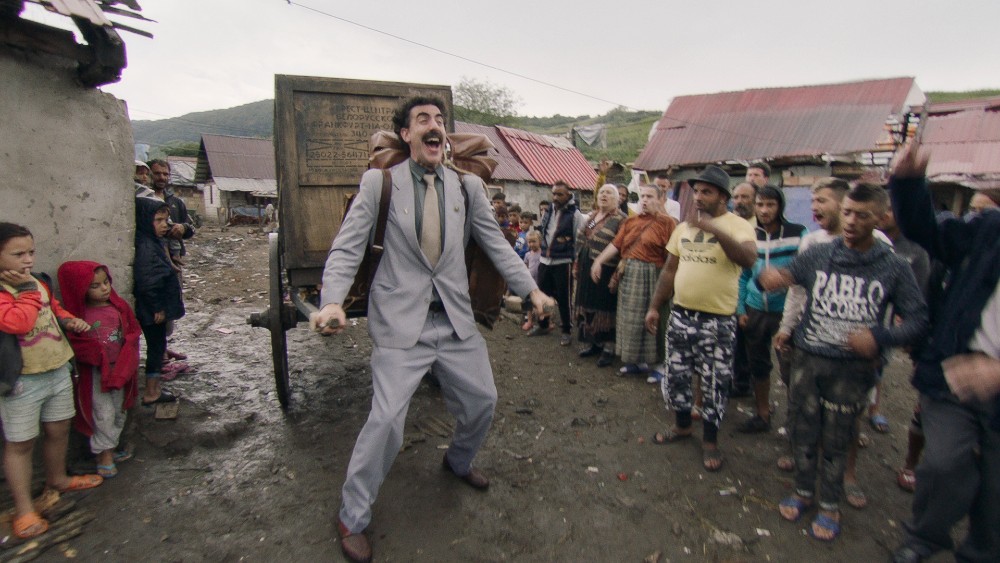SUMMARY
This is AI generated summarization, which may have errors. For context, always refer to the full article.
![[Only IN Hollywood] Sacha Baron Cohen on the Giuliani scene, fighting the ‘dangerous slide towards autocracy’](https://www.rappler.com/tachyon/2020/10/BoratSubsequentFilm1.jpg)
Sacha Baron Cohen dished about Rudy Giuliani, Trump’s personal lawyer, being caught on camera, and appearing to touch his genitals in front of a woman in the new Borat movie.
Sacha also echoed Rappler CEO and executive editor Maria Ressa’s assertion that strongmen, including the Philippines’ President Rodrigo Duterte, are abusing social media to promote disinformation.
In the Borat sequel which must have the world’s longest film title ever, Borat Subsequent Moviefilm: Delivery of Prodigious Bribe to American Regime for Make Benefit Once Glorious Nation of Kazakhstan (whew!), Giuliani is captured on film lying down and putting his hands in his pants.
Actress Maria Bakalova, pretending to be a journalist, had just interviewed Giuliani, New York’s ex-mayor and Trump’s current personal attorney, in a hotel suite. When they went to the bedroom, Maria removed Giuliani’s microphone. He lay down on the bed and can clearly be seen sliding his hands into his trousers in front of Maria.
“I’d say the only person responsible for what Rudy Giuliani did is Rudy Giuliani,” stressed Sacha, a Cambridge-educated comedian noted for being a savage satirist. Since news stories and film reviews came out about Giuliani in a compromising situation with a woman, the Trump ally claimed the video was a fabrication and that he was just tucking his shirt in.
“Rudy said that he did nothing inappropriate,” said Sacha about Rudy’s behavior with Maria, who portrays Borat’s teenage daughter, Tutar Sagdiyev. But in that controversial scene in the comedy now streaming on Amazon, she pretended to be a TV journalist.

“This is a fascinating window into what the Trump regime deems is appropriate behavior with women,” Sacha remarked. “I really want people to see the film and what you see is what it is. I want people to take from the film whatever they want, and to come to their own conclusions.”
The English actor emphasized that he and the crew were ready to jump in at any time in the hotel room scene. “As a producer, I would never have let an actress be in a dangerous situation so the idea was always to intervene.”
Asked if Rudy knew it was Sacha as Borat barging in as a sound man during the interview and then later on in the bedroom (with Borat in pink lingerie), the actor said, “I’ll let him speak for himself. He gave a number of interviews afterwards.”
“People will have their own moral judgements about every single person in the movie. Some of them will have moral judgements about me. And that’s fine.”
“But I’m always reluctant to take away from the viewing experience. So I would say that people should watch the movie and judge for themselves. I trust and I believe in the audience.”
Since Borat Subsequent Moviefilm calls out Facebook and other social media platforms for boosting disinformation, I asked Sacha about how his main target, Trump, and strongmen around the world, have latched on to the catch phrase, “fake news,” to dismiss any story that is critical of them.
“One of the most brilliant moves by Donald Trump was to co-opt the very thing that got him into power,” began the erudite actor, whose Borat, Ali G and Bruno are nothing all like his real-life self.
Well, except that naughty glimmer which occasionally flashes in his eyes. In our video call, we saw plenty of that in the man who was calling from a hotel room in San Francisco.
Since 2010, Sacha has been married to actress Isla Fisher. They have three kids.
In our past in-person interviews with Sacha, he appeared in character as Borat or Bruno for an hour in each talk. It’s a feat to stay in character even for only 15 minutes. This time, he didn’t talk as Borat because he was also promoting Netflix’s The Trial of the Chicago 7. A fine actor, Sacha is excellent as Abbie Hoffman.

“Trump was brought into power by fake news stories that convinced people to vote for him,” Sacha continued about tyrants and fake news. “But it was an Orwellian stroke of genius to co-opt and control that very phrase and use it against legitimate journalists.”
“The famous rule of propaganda is repeat the lie again and again. Eventually, it becomes ingrained into your psyches. People start dismissing things by saying, it’s fake news.”
“America is still the most influential country in the world, so when an authoritarian leader or demagogue is elected in the most influential country and democracy in the world, that has ripple effects internationally. It becomes much easier for other countries and other democracies to elect similar demagogues.”
“Secondly, I do believe that this trend of demagogues taking power is not coincidental. I believe that it is correlated with the changes that the internet wrought in social media. Democracy relies on shared truths and autocracies rely on shared lies.”
“Social media is the greatest propaganda machine in history. It’s ideally suited to spread those lies far and wide and faster than truths. So democratic leaders are always at a disadvantage, because the truth is not exciting.”
“Truth is boring. It’s dull and so it does not provide click bait. This technological revolution is controlled by a handful of people who do not have any real investment in preserving democracy.”
“In the last five years, we have seen votes that were very surprising to political analysts, in that they seem to be illogical votes, where the populace are voting against their interests. There’s this symbiotic relationship between social media and autocratic leaders.”
One of Sacha’s daring pranks was gatecrashing the 2020 Conservative Political Action Conference (CPAC) in Maryland as vice president Mike Pence gave a speech. As if crashing that event was not tough enough, Sacha wore a Trump fat suit, including a prosthetic head, to “blend in.”
“CPAC was very challenging because the vice president was speaking,” Sacha admitted. “He has the same security level as the president (Trump) himself. I knew that I was going to have to infiltrate CPAC as a Donald Trump lookalike. So I was wearing a 54 inch fat suit and a fake head.”
“I knew that I would have to get through the highest level of security. It was actually terrifying because I went through security which is the third level of security. I requested to the person who made the fat suit that there be no wires at all in the fat suit and nothing that would set off a metal detector.”
“But immediately, the wand (hand-held metal detector) beeped when the security officer put it over my chest. He said, what is that? I said, it’s a pacemaker. So he started wanding me again and all the way down. He gets down to my belly and it beeps again.”

“He said, hold on, what’s that? I didn’t know what to say because I could understand a pacemaker near the heart but why something down near my belly? There was like an awkward silence. He looks at me and said, hold on, that’s the wire for the pacemaker, right? I said yes, that’s right. He goes okay, you can go forward.”
“So I went from there to hide in a bathroom for five hours, listening to the sounds of various conservative men do their thing. And then when the actual (he was able to get inside the auditorium)…I was apprehended and surrounded by the Secret Service. There were different types of police there and event security.”
“The main thing I wanted to do was to prevent anyone knowing that it was me because if it got out in the media that I was at CPAC, that would have been a bigger story. So for the longest time, I tried to prevent the policemen from getting my ID. I was surrounded by about 12 of them. At one point, they said, give me your ID.”
“My aim was to try and stall them as long as I could (laughs). So I said, I need to see some ID to verify that you are indeed a law enforcement officer. This officer pointed to a massive badge around his neck and said, how about this? I said, how do I know that’s actually the real thing?”
“One of the Secret Service guys said, you’re going to have to give over your ID. I said, it’s in my shoe. Do you want me to take off my shoe? He said, no, that’s fine. Later on, his superior officer came over to him and said, where’s the ID? He said, I don’t have it. He goes, why not? He goes, it’s in his shoe. They never actually got my ID.”
On encountering first hand bigotry and anti-Semitism while he was going around the US as Borat, the man born in west London to Jewish parents answered, “The first movie was more about exposing this unpleasant and ugly underbelly of America. This time around, I realized that underbelly has been exposed. It’s overt since opinions that we would have put on screen back in 2006 are now being espoused by the president of America.”
“So actually, in this movie, part of my attempt was to show the humanity of some of the people who espouse these horrific views. There are two conspiracy theorists whom I spent five days living with, in character.”
“I wanted to show that they were human beings. They were actually, underneath it all, good people who had been fed lies through social media and the internet. And they believed it. The issue with the internet is that it doesn’t differentiate between factual information and conspiracy theories. They each are presented in the same way.”
“Actually, conspiracy theories and lies spread faster on the internet than truth, which is boring. So I wanted to show that in this incredibly divided country and world, that there is actually common ground. There is humanity on the other side. I feel that although there’s increasing hostility between the sides, I wanted to demonstrate that there is commonality.”
Since Borat was already well-known, that presented a challenge for Sacha this time around. He explained, “This was the most challenging movie that I’ve ever made because I was taking my most famous character, and it’s a character that is known worldwide, and trying to make a movie with real people. I assumed that it would be impossible to do.”
“Borat is the perfect character for Trump because Borat is a slightly more extreme version of Trump. They are both misogynistic, racist, support anti-Semites, cannot care less about democracy, hold very old world views. They’re both laughable characters.”
“I realized that by talking as Borat to some Trump supporters, I could actually get them to reveal how far they were willing to go because what is publicly said by the president and some of his supporters is so extreme. I thought, how do you satirize that? By using Borat, you can let them really reveal how much further they are willing to go.”
“So when it came to the gun rally in Washington State and getting a crowd of people to agree (to sing along to a song) to slice up journalists like the Saudis do (referring to the murder of U.S.-based journalist Jamal Khashoggi in a Saudi consulate in Turkey in 2018), what I wanted to reveal again was that we are on a precipice where we can see the edge of democracy.”
“After that, we fall into the abyss of autocracy, where it’s not just verbal attacks on journalists like yourself. It’s physical attacks and the autocracies fight free speech and they imprison those who are challenging them, and a number of those are journalists. So I know that as a member of a journalistic association, you occasionally feel under threat.”
“I brought out my own fake news journalist to make America and the world laugh but to try occasionally to show the danger that lies ahead in the next few weeks.”

On how he got away with his pranks, with ever present cameras, Sacha shared, “The cameras are almost always visible. People are agreeing to be on television. The main way we do it is people want to be on television.”
“In terms of the adrenaline, they are exhausting days. There are obviously a lot more lines in Borat than for any other movie because you need to be fully prepared for any question that anyone may ask you. When you’re an actor, you’re preparing for maybe two or three pages of dialogue in a day.”
“As Borat, you are preparing for a hundred pages of dialogue within a day. The character itself has to be fully three-dimensional. There can’t be any chinks in the armor. That means my preparation is from knowing everything about this mythical country that we have invented, to knowing everything about Borat’s family, his friends, acquaintances, everyone in government in this mythical version of Kazakhstan.”
“I even do things like I make sure my smell is so abhorrent that people are aware they are in the presence of somebody who is from a different civilization. So it’s very hard for people to be around me because the smell is so repulsive.”
“Everything about me, from down to the underwear, is authentic. Everything in my wallet. If somebody took out every pocket on me at any point, it would be completely consistent in keeping in character. The idea is to create a fully believable character that it’s impossible to see through. I must say this was my hardest ever acting challenge.”
“In one scene, I stayed in character for about 125 hours. I slept in Borat’s pajamas. I lived in a house with two guys. I realized that to really get to know them, to really expose their humanity and to really have the movie progress and get the plot points that we needed, I had to be Borat for five days.”
“And in a variety of locations because I went with them in the end to that gun rally. That was the deepest I had ever been in character. I remember on the second night, locking the door of my bedroom and walking around trying to find my toothbrush.”
“I was walking in this very clumsy way and after about 10 minutes, I couldn’t find my toothbrush. I realized I was still Borat. I didn’t get out of the character even though I was by myself. I remember I had to mentally tell myself, you are not this guy.”
Sacha, who just turned 49 last October 13, makes no bones about why he made Borat Subsequent Moviefilm. “I made this movie for release prior to the (Nov. 3 US presidential) election. I was concerned ever since Trump was elected about the undermining of our democratic institutions and the incremental slide towards autocracy. I’m deeply concerned about the upcoming election and fear that even if he loses, that he may try to stay in power.”
“This movie is intended to be the funniest movie since the first Borat. But it’s also meant to be a warning about the dangerous slide towards autocracy where we’re incrementally moving away from this wonderful ideal of American democracy.
“The next few weeks will determine whether the U.S. remains a democracy or slips into autocracy. I really believe we all have to raise our voice. I am a comedian, a filmmaker, and that is why I am releasing this movie now because this is my form of protest. This is me raising my voice in the only way I know how to.” – Rappler.com
Add a comment
How does this make you feel?
![[Only IN Hollywood] A lot of Robert Downey Jr., Vietnamese actors bring ‘The Sympathizer’ to life](https://www.rappler.com/tachyon/2024/04/only-in-hollywood-robert-downey-jr-April-18-2024.jpg?resize=257%2C257&crop=58px%2C0px%2C720px%2C720px)
![[Only IN Hollywood] Decrying why there is no sex in movies, Lanthimos delivers a lot of it in masterpiece](https://www.rappler.com/tachyon/2023/09/poor-things-.png?resize=257%2C257&crop=245px%2C0px%2C698px%2C698px)
![[Only IN Hollywood] Dolly de Leon leads 2022 Filipino newsmakers in international entertainment](https://www.rappler.com/tachyon/2022/12/only-in-hollywood-2022-recap-thumbnail.jpg?resize=257%2C257&crop=380px%2C0px%2C900px%2C900px)
![[Only IN Hollywood] Pinoys Soliman Cruz, Lav Diaz and Matthew Libatique triumph in Venice](https://www.rappler.com/tachyon/2022/09/only-in-hollywood.jpg?resize=257%2C257&crop_strategy=attention)
![[Only IN Hollywood] Mark Wahlberg opens up about his faith, journey as a Catholic star in Hollywood](https://www.rappler.com/tachyon/2022/06/Father-Stu-Mark-Wahlberg-2.jpg?resize=257%2C257&crop=232px%2C0px%2C853px%2C853px)
There are no comments yet. Add your comment to start the conversation.